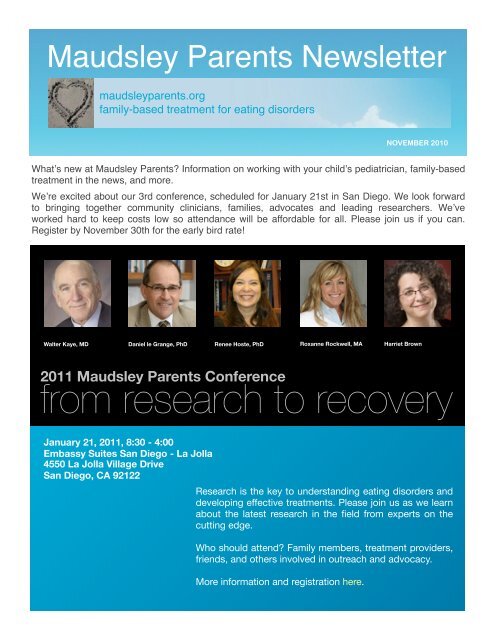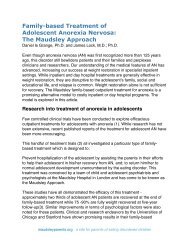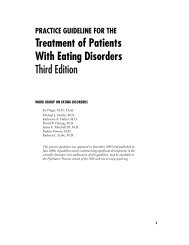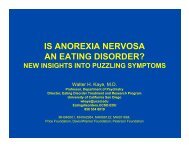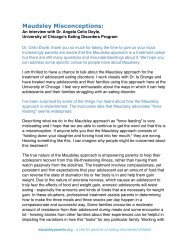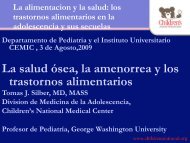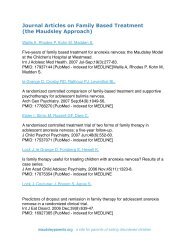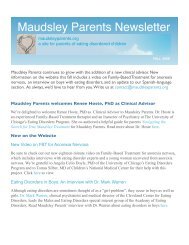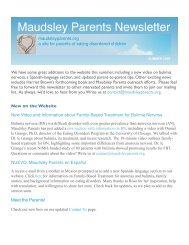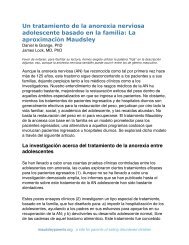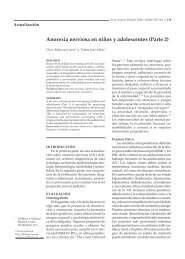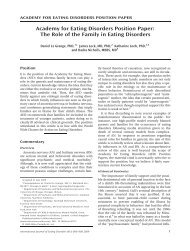November 10 - Maudsley Parents
November 10 - Maudsley Parents
November 10 - Maudsley Parents
You also want an ePaper? Increase the reach of your titles
YUMPU automatically turns print PDFs into web optimized ePapers that Google loves.
Consulting A Physician About Your Childʼs Eating Disorder SymptomsJocelyn Lebow, MSBecause of the range of medical complications and consequences of any level of eating disorder symptoms, it’simportant to have your child evaluated regularly by her pediatrician while she is at risk. Some doctors are wellversed in the specific health concerns that go along with anorexia and bulimia symptoms. However, it’sfrequently surprising to parents how many highly competent doctors fail to recognize symptoms and/or don’ttake them seriously. It’s not unusual for a well-meaning doctor to reassure a parent long past the point when thechild needs help. Other doctors might not be aware exactly what to check for, or what tests should be run whenassessing a child with eating disorder symptoms.So if you suspect your child has symptoms of an eating disorder, make sure you ask the doctor to do these fourthings:1. Rule out any other medical cause of weight loss, appetite loss, missed period or other physical symptoms(e.g. light-headedness, fainting) you suspect are related to an eating disorder. This can be done via lab testsand/or a physical (see number 3).2. Obtain reliable measurements of height and weight and see how these current measurements compare toyour child’s typical position on the growth chart in past years (teenagers should be continuing to gain weightat a fairly consistent rate given their history. Maintaining the same weight, even without any loss, might because for concern if their height/weight ratio has changed significantly)3. A complete physical (e.g., assessment of weight for height, blood pressure, heart rates, body temperature)as well as specific laboratory tests to check for signs of malnutrition, binge eating and/or purging. Theseexaminations help assess the degree of illness, its chronicity, as well as rule out other possible organicreasons for symptoms.4. High priority tests you should be sure to request include:• Complete Blood Count (CBC)• Comprehensive Metabolic Panel (CMP) especially all tests of electrolytes (sodium, potassium,bicarbonate and chloride) as well as calcium and tests of kidney function (BUN and creatinine)• Serum Magnesium• Thyroid Panel• Transthyretin (Prealbumin)Your doctor will be able to give you much more detail about what each test measures and what the results mean.For a general overview of common laboratory tests run for eating disorder patients, click here.If the results of this examination suggest that the your child’s symptoms are more severe or have had moreserious physical effects than you suspected, your next step is to set up a schedule of regular assessments with aphysician who specializes in eating disorders. If your pediatrician doesn’t have the necessary expertise, he orshe should be able to provide a referral to a doctor who has experience working with eating-disorderedteenagers. Scheduling such an evaluation may be somewhat complicated due to insurance processes and limitedavailability of experts in eating disorders. But these obstacles can usually be overcome with persistence and areferral from a pediatrician specifying the need for the consultation.
If your doctor would like more information on FBT(the <strong>Maudsley</strong> approach), there are resources linkedon the <strong>Maudsley</strong> <strong>Parents</strong> webpage for doctors.** A note: Because of the nature of eating disorders,your teenager might minimize symptoms, and may notbe entirely truthful when talking to a doctor. It’simperative for you to be present during the entirecheck-up, particularly when the doctor is taking yourchild’s history, to ensure the physician is not misled asto the severity of your child’s symptoms.Family-Based TreatmentIn the NewsThe publication of a new study in theArchives of General Psychiatry made a bigsplash in the media. 120 anorexia nervosapatients were recruited at the University ofChicago and Stanford University andassigned randomly to either family-basedtreatment or adolescent focused therapy.Check out some of the coverage:New on the WebsiteInformation for pediatriciansThe pediatrician is a key member of theteam treating any child or teen with aneating disorder. Weʼve pulled together ashort focused list of resources on familybasedtreatment and eating disorders,including information from the AmericanAcademy of Pediatrics, the CanadianPaediatric Society, the Society forAdolescent Medicine and the Academy forEating Disorders. Check it out here.Ask an Expert IndexScan through our list of “Ask an Expert” Q& As here or read the full text of allquestions and answers here. Still have aquestion youʼd like answered? Send us anemail at experts@maudsleyparents.org.Treatment Provider UpdatesLooking for a family-based treatmenttherapist? Check out our provider listingand advice on finding treatment.New VideoDr. Daniel le Grangeʼs talk from ourBethesda conference with a detaileddiscussion of the recently published studyon family-based treatment here.New York Times: Bringing In Family ToCombat AnorexiaNPR Morning Edition: <strong>Parents</strong> Can MakeA Difference With Anorexic TeensNewsweek: Anorexia Teens Get BoostFrom Family-Based TreatmentWall Street Journal: Parental Role AidsIn Anorexia RecoveryChicago Tribune: Study: Family-basedAnorexia Treatment Most EffectiveBusiness Week: Anorexic Teens MayGain from Whole-Family TreatmentMSNBC: Anorexic Teens Recover BetterWith Parental HelpWebMD: Family Therapy ProvidesLonger-lasting Recovery for Teenagerswith AnorexiaUS News and World Report: Family-Based Therapy: An Eating-DisorderTreatment That Works and 5 EatingDisorder Signs in Your Child.Diane Rehm Show: New Treatments forEating Disorders
Family Internet-based Early Bulimia Nervosa StudyThe University of Chicago is conducting a research study designed to examine the efficacyof an Internet-based program for parents with adolescent children who show early signs ofbulimia nervosa. We are seeking families who have an adolescent (ages 12-17) whoengages in binge eating (large amounts of food in a short period of time) and/orcompensatory purging (e.g., vomiting). Participating families will use an Internet-basedprogram to address their adolescentʼs eating disorder symptoms.To be eligible:* Families with an adolescent child (ages 12-17)* Adolescent demonstrates eating disorder symptomsFor information call:Colleen Stiles-Shields at 773-834-5677 and mention your interest in theFamily Internet-based Early Bulimia Nervosa Study or e-mail Jocelyn Lebow atjlebow@yoda.bsd.uchicago.eduTo learn more, or to register online, visit: http://epathprogram.org/Are you a therapist looking forfamily-based treatment training?A workshop will be offered February 26and 27, 2011 at Stanford University in PaloAlto, CA by the Training Institute for Childand Adolescent Eating Disorders. Visit theInstitute website to learn more attrain2treat4ed.com. Trainees/students payhalf price for the workshop.Brave Girl Eatingby Harriet BrownNow available fromAmazon here.connect with maudsley parents on the webfriend us on facebook here read Harrietʼs blog here follow Jane on twitter hereblog


